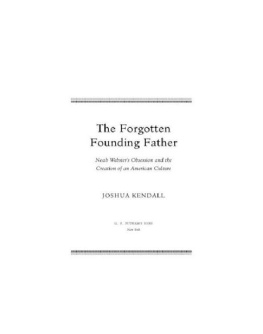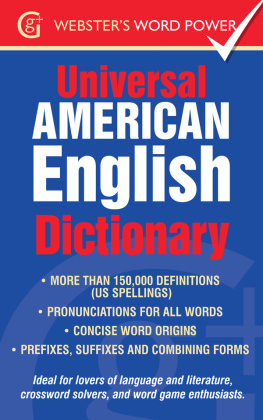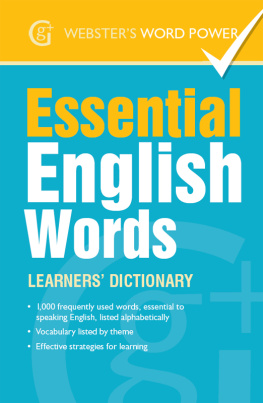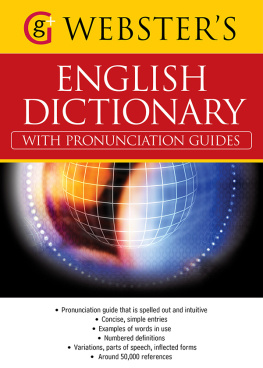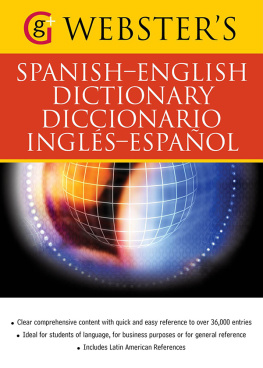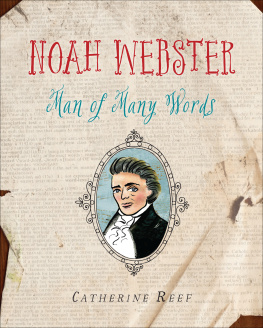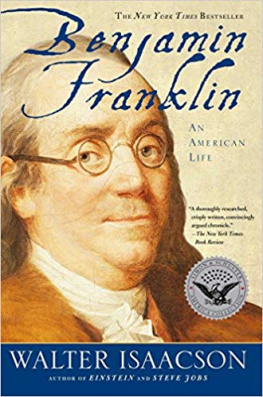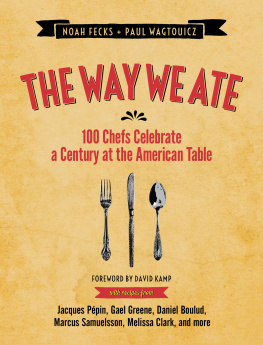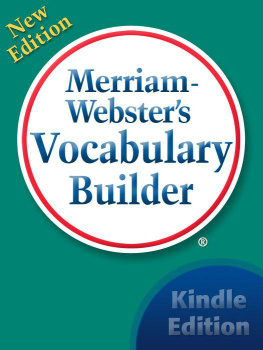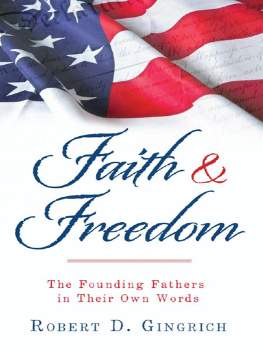Acknowledgments
GRATITUDE, n. An emotion of the heart, excited by a favor or benefit received; a sentiment of kindness or good will toward a benefactor; thankfulness.
A Yale degree may well be a prerequisite for writing about this quintessential Yale manthe vast majority of Webster biographers have had oneand a delightful by-product of this project was the chance to renew the ties with my alma mater. I thank Lauralee Field of the Office of the Vice President and Secretary at Yale for inviting me to speak at the conference, Noah Webster 250: Shaping a Language, Defining a Nation, held in New Haven on October 16 and 17, 2008. I was the lunchtime speaker on the seventeenthI shared the bill with complimentary bowls of chowder (a word first defined by Webster). Portions of this lecture, Noah Websters Obsession and the Creation of Americas First Dictionary, which argued that Websters personality disorder was instrumental to his literary success, worked their way into the prologue.
The previous day, October 16, 2008, Noah Websters 250th birthday, I had the distinct pleasure of dining with the roughly ten other presenters at Silliman College on the corner of Temple and Grove streetsthe site of Websters second New Haven residence. Throughout the conference, I enjoyed extended conversations with this All-Star Team of Webster scholars and aficionados, which included Harvard professor Jill Lepore, the keynote speaker; Yale professors emeriti Howard Lamar and Fred Robinson; Judith Schiff, Chief Research Archivist at the Yale University Library; and Peter Sokolowski, a lexicographer at Merriam-Webster. I also met Michael Magruder, a direct descendant of Noah Websterhis grandmother, Rosalie Eugenia Stuart Webster was the daughter of William Websters son Eugene.
Given our shared obsession with all things Noah Webster, it isnt surprising that I would develop lasting friendships with these colleagues from the conference. I am particularly grateful to Howard Lamar for taking the time to read and comment on the entire manuscript. I am also indebted to Fred Robinson for his careful examination of chapters on the dictionary and for fielding all my questions about Anglo-Saxon (and Noah Websters dubious knowledge thereof). Likewise, Judith Schiff was kind enough to review the parts of the manuscript related to Websters life in New Haven. And I appreciate Peter Sokolowskis willingness to host me for a day at his office in Springfield and for helping to set up the interviews with Stephen J. Perrault, Merriam-Websters director of defining, and John Morse, the companys CEO. (This dictionary publisher is also a dictionary sleuth, and his assistance proved critical in determining W. C. Minors precise affiliation with Websters.) And I thank Jill Lepore for both grounding me in current Webster scholarship and sharing her considerable insight into Noah Websters troubled inner world. And thanks to Michael Magruder for filling me in on the familys history over a series of lunches in Cambridge.
I also reconnected with my undergraduate home, Trumbull College, where I stayed during the October 2008 conference. I was pleased to accept Master Janet Henrichs invitation to come back and give a Masters Tea on November 6, 2008. That second Yale talk given before Trumbull undergraduates and assorted guests, The Yale College of Three Run-Down Buildings, Three Thousand Books and Injun Pudding that Launched the Literary Career of Americas Greatest Lexicographer featured some of the material covered in chapter one.
One cant write about Webster without wrestling with the legacy of his idol and predecessor, Samuel Johnson, and I am grateful for the input of several Samuel Johnson/James Boswell scholars, including Jack Lynch, Robert DeMaria, James Basker, Helen Deutsch, Gordon Turn-bull, Allen Reddick, Anne McDermott and Peter Martin. Fortunately, I was able to track all of them down in the same placethe thoroughly engaging conference commemorating Dr. Johnsons three hundredth birthday hosted by Harvards Houghton Library in August 2009.
I would also like to acknowledge other scholars who graciously responded to my queries, including Bob Arnebeck, Philip Barnard, Richard Buel, Carolyn Cooper, Simon Finger, Earle Havens, Jane Kamensky, Kate Keller and Brooks Swett.
Spending time in museums and archive libraries is one of the highlights of my day job. While numerous museum directors, curators and archivists provided valuable assistance, a few deserve special mention: Chris Dobbs, the director of the Noah Webster House; Willis Bridgeam, the librarian emeritus of Amherst Colleges Frost Library; James Rees, the executive director of George Washingtons Mount Vernon Estate and Garden, and Brian Lemay, the executive director of the Bostonian Society.
At Putnam, I would like to thank my editor, Kathryn Davis, as well as Ivan Held for their steadfast dedication to this project. Im also grateful to Marilyn Ducksworth, Stephanie Sorensen and Matthew Venzon in publicity and to Kate Stark and Chris Nelson in marketing.
My agent, Lane Zachary, provided insightful comments on the manuscript. And Rachel Youdelman conducted her impeccably thorough photo research, which unearthed several buried treasures.
I also thank the Virginia Center for the Creative Arts for a fellowship that funded a two-week residency in January 2009.
ALSO BY JOSHUA KENDALL
The Man Who Made Lists:
Love, Death, Madness, and the Creation of Rogets Thesaurus
ALSO BY JOSHUA KENDALL
The Man Who Made Lists:
Love, Death, Madness, and the Creation of Rogets Thesaurus
About the Author
Joshua Kendall is the author of The Man Who Made Lists: Love, Death, Madness, and the Creation of Rogets Thesaurus, a biography of the Victorian physician and wordsmith Peter Mark Roget. Kendalls award-winning journalism, which has focused on health care and psychiatry as well as biography, has appeared in numerous publications, including The Boston Globe, BusinessWeek, The Los Angeles Times, Psychology Today, The Wall Street Journal and The Washington Post. He received his B.A. in comparative literature summa cum laude from Yale College. He also did graduate work in comparative literature at Johns Hopkins. Kendall, who lives in Boston, is currently an Associate Fellow at Yales Trumbull College.
A Note on Sources
RESEARCH, n. Diligent inquiry or examination in seeking facts or principles; laborious or continued search after truth.
A few years after Websters death, his son-in-law Chauncey
Goodrich wrote the first detailed sketch of the lexicographers life, which was inserted into the 1847 edition of The American Dictionary. A generation later, journalist Horace Scudder, who would go on to become the editor of The Atlantic Monthly, published the first biography, Noah Webster (Boston, 1882). More interpretive essay than scholarly treatment, Scudders work focused on Websters major achievementsthe speller, the political writings and the dictionary. Scudders occasional allusions to the Connecticut Yankees idiosyncrasies irked the family. Of Scudders slender volume, Websters granddaughter Emily Ford noted in 1892, [it] seems to me to discolor his character, to belittle his work as well as his aims and to make him out an egotist of persistent self-conceit in his career. In response, Ford began compiling Websters personal papers. After Fords death in 1902, her daughter, Emily Skeel, finished the two-volume biography, Notes on a Life of Noah Webster (New York, 1912). This privately printed work, which is available only at major research libraries, features a wealth of valuable primary-source materials, including the complete text of Websters diary, which he kept from 1784 to 1820, and extended excerpts from dozens of letters by and to Webster.

